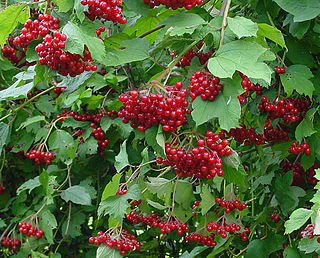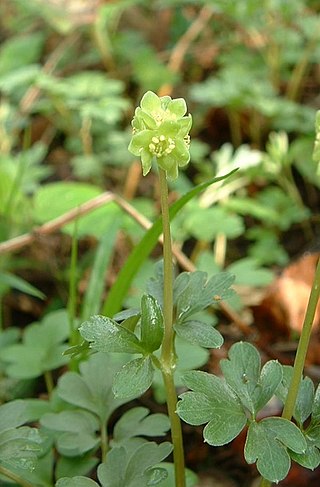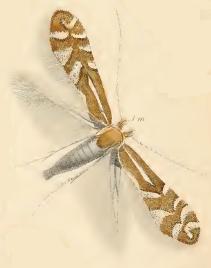
Viburnum is a genus of about 150–175 species of flowering plants in the moschatel family, Adoxaceae. Its current classification is based on molecular phylogeny. It was previously included in the honeysuckle family Caprifoliaceae.

Viburnum lentago, the nannyberry, sheepberry, or sweet viburnum, is a species of Viburnum native to North America.

Adoxaceae, commonly known as moschatel family, is a small family of flowering plants in the order Dipsacales, now consisting of five genera and about 150–200 species. They are characterised by opposite toothed leaves, small five- or, more rarely, four-petalled flowers in cymose inflorescences, and the fruit being a drupe. They are thus similar to many Cornaceae.

The Southeast Missouri Lead District, commonly called the Lead Belt, is a lead mining district in the southeastern part of Missouri. Counties in the Lead Belt include Saint Francois, Crawford, Dent, Iron, Madison, Reynolds, and Washington. This mining district is the most important and critical lead producer in the United States.

Viburnum opulus, the guelder-rose or guelder rose is an Old World species of flowering plant in the family Adoxaceae.

Viburnum tinus, the laurustinus, laurustine or laurestine, is a species of flowering plant in the family Adoxaceae, native to the Mediterranean area of Europe and North Africa. Laurus signifies the leaves' similarities to bay laurel.

Viburnum acerifolium, the mapleleaf viburnum, maple-leaved arrowwood or dockmackie, is a species of Viburnum native to eastern North America.

Viburnum lantana, the wayfarer or wayfaring tree, is a species of Viburnum, native to central, southern and western Europe, northwest Africa, and southwestern Asia. The vigorous deciduous European treelike shrub is common along waysides.

Viburnum trilobum is a species of Viburnum native to northern North America, from Newfoundland west to British Columbia, south to Washington state and east to northern Virginia. It is very closely related to the European and Asian Viburnum opulus, and is often treated as a variety of it, as Viburnum opulus L. var. americanum Ait., or as a subspecies, Viburnum opulus subsp. trilobum (Marshall) Clausen.

Gracillariidae is an important family of insects in the order Lepidoptera and the principal family of leaf miners that includes several economic, horticultural or recently invasive pest species such as the horse-chestnut leaf miner, Cameraria ohridella.

Viburnum plicatum is a species of flowering plant in the family Adoxaceae, native to mainland China, Korea, Japan, and Taiwan. The Latin specific epithet plicatum means "pleated", referring to the texture of the leaves.
USS Viburnum (AN-57/YN-76) was a Ailanthus-class net laying ship which served with the U.S. Navy in the Pacific Ocean theatre of operations. While operating in the Caroline Islands, she was severely damaged when struck by what appeared to be a Japanese torpedo. However, she continued her work as well as she could, and, when she returned to the United States, she was considered too damaged to repair. She was sold in her damaged condition, and was eventually scrapped.

Phyllonorycter lantanella is a moth of the family Gracillariidae. It is found in all of Europe, except Scandinavia, Ireland and the Balkan Peninsula.
Cameraria hikosanensis is a moth of the family Gracillariidae. It is known from Kyushu, Japan.
Dialectica geometra is a moth of the family Gracillariidae. It is known from Hong Kong, Japan, India and Réunion. It has recently been recorded from China.
Phyllonorycter cinctata is a moth of the family Gracillariidae. It is known from the Nepal.

Viburnum carlesii, the arrowwood or Korean spice viburnum, is a species of flowering plant in the family Adoxaceae, native to Korea and Japan and naturalised in Ohio, USA. Growing to 2 m (7 ft) tall and broad, it is a bushy deciduous shrub with oval leaves which are copper-coloured when young. Round clusters of red buds open to strongly scented, pale pink flowers in late spring. These are followed in late summer by oval red fruits ripening to black in autumn.

Gracillariinae are a subfamily of moths which was described by Henry Tibbats Stainton in 1854.

Viburnum odoratissimum, commonly known as sweet viburnum, is a shrub or small tree in the family Adoxaceae. It is native to Asia, and commonly cultivated as a garden ornamental elsewhere.

Viburnum dilatatum, commonly known as linden arrowwood or linden viburnum, is a deciduous shrub in the moschatel family (Adoxaceae). It is native to eastern Asia, and can be found as an introduced plant in the mid-Atlantic regions in the U.S from New York to Virginia. Linden arrowwood is known for the clusters of red drupes it produces when it is mature.














